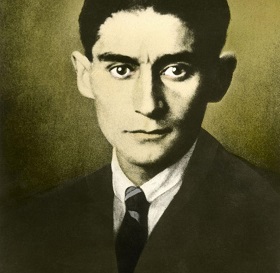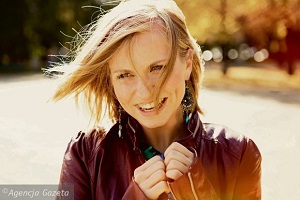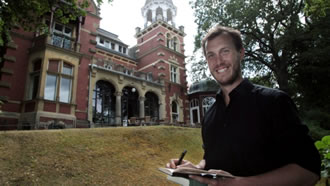De Duitstalige schrijver Franz Kafka werd geboren op 3 juli 1883 in Praag, toen een stad gelegen in de dubbelmonarchie Oostenrijk-Hongarije. Zie ook alle tags voor Franz Kafka op dit blog.
Uit: The Trial (Vertaald door David Wyllie)
“Someone
must have been telling lies about Josef K., he knew he had done nothing
wrong but, one morning, he was arrested. Every day at eight in the
morning he was brought his breakfast by Mrs. Grubach’s cook – Mrs.
Grubach was his landlady – but today she didn’t come. That had never
happened before. K. waited a little while, looked from his pillow at the
old woman who lived opposite and who was watching him with an
inquisitiveness quite unusual for her, and finally, both hungry and
disconcerted, rang the bell. There was immediately a knock at the door
and a man entered. He had never seen the man in this house before. He
was slim but firmly built, his clothes were black and close-fitting,
with many folds and pockets, buckles and buttons and a belt, all of
which gave the impression of being very practical but without making it
very clear what they were actually for. “Who are you?” asked K., sitting
half upright in his bed. The man, however, ignored the question as if
his arrival simply had to be accepted, and merely replied, “You rang?”
“Anna should have brought me my breakfast,” said K. He tried to work out
who the man actually was, first in silence, just through observation
and by thinking about it, but the man didn’t stay still to be looked at
for very long. Instead he went over to the door, opened it slightly, and
said to someone who was clearly standing immediately behind it, “He
wants Anna to bring him his breakfast.” There was a little laughter in
the neighbouring room, it was not clear from the sound of it whether
there were several people laughing. The strange man could not have
learned anything from it that he hadn’t known already, but now he said
to K., as if making his report “It is not possible.” “It would be the
first time that’s happened,” said K., as he jumped out of bed and
quickly pulled on his trousers. “I want to see who that is in the next
room, and why it is that Mrs. Grubach has let me be disturbed in this
way.” It immediately occurred to him that he needn’t have said this out
loud, and that he must to some extent have acknowledged their authority
by doing so, but that didn’t seem important to him at the time. That, at
least, is how the stranger took it, as he said, “Don’t you think you’d
better stay where you are?” “I want neither to stay here nor to be
spoken to by you until you’ve introduced yourself.” “I meant it for your
own good,” said the stranger and opened the door, this time without
being asked. The next room, which K. entered more slowly than he had
intended, looked at first glance exactly the same as it had the previous
evening. It was Mrs. Grubach’s living room, over-filled with furniture,
tablecloths, porcelain and photographs.”

Cover
De Duitse schrijver Christopher Kloeble werd op 3 juli 1982 geboren in München. Zie ook alle tags voor Christopher Kloeble op dit blog.
Uit: Die unsterbliche Familie Salz
„Ihr
Leben reichte so weit zurück, dass die meisten Jahre davon längst in
Geschichtsbüchern standen. Sie war ein lebendes Beispiel dafür, wie
wenig von dem, was wir sind, übrig bleibt. Nicht umsonst bezeichnen wir
das Früher als Geschichte. Mehr als eine Geschichte, die sich die
Lebenden über die Toten erzählen, ist es nämlich nicht.
In
meinem Fall könnte es eine sehr kurze Geschichte werden. Ich weiß
nicht, ob ich nächstes Jahr noch leben werde. Ich glaube daran. Aber ich
weiß es nicht. Deshalb muss ich häufig an meine
Großmutter denken. Was hatte sie mitzuteilen? Und was habe dagegen ich, die beträchtlich jüngere Enkelin, mitzuteilen?
Vielleicht
war ihr Gerede viel mehr, als wir ahnten, vielleicht erzählte sie als
Fast-Tote eine Geschichte über die Lebenden, aus der wir, auch wenn es
nur eine Geschichte war, viel hätten lernen können.
Hätten wir uns mehr Mühe geben sollen, sie zu verstehen?
Meine
Mutter, die ihr nie besonders zugetan gewesen war, nannte den kaum
verständlichen Monolog Lolas Bewerbungsgespräch für den Tod. Den Tod
schien meine Großmutter, anders als ich, allerdings nicht sonderlich zu
interessieren, er ignorierte sie lange Zeit. Was auch immer in Lolas
Kopf vor sich ging, sie driftete viele Jahre lang irgendwo zwischen hier
und dort. Immer im Fürstenhof, der einst das Zuhause ihrer Familie
gewesen war.
Dort
übte sie als untoter Dauergast ihr lebenslängliches Wohnrecht aus – sie
besetzte eine Suite direkt unter dem Dach, auf dem sie gestürzt war.
Und wartete auf ihren zweiten Tod.“
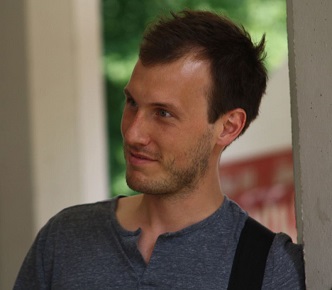
De Poolse schrijfster en journaliste Dorota Masłowska werd op 3 juli 1983 in Wejherowo geboren. Zie ook alle tags voor Dorota Masłowska op dit blog.
Uit: Liebling, ich habe die Katzen getötet (Vertaald door Olaf Kühl)
„Auf
der Straße vor dem Haus lag eine Katze mit wei-ßem Latz, sich in der
Sonne wärmend oder doch eher gar nicht lebend, ausgehend von der
Tatsache, dass die Sonne nicht schien und es auch sonst keinen Grund
gab, mitten zwischen den rasenden Autos zu liegen. Wird ja mal eine
Streife kommen und sie mitnehmen, dachte Farah in die-sem Traum, rückte
das Unterteil ihres Pyjamas, das ihr in die Leiste schnitt, zurecht und
kehrte zur Lektüre der Zeitschrift zurück. Sie war gerade bei einem
Psychotest und … In Ihrem Leben ist vermutlich auch nicht immer Raum
und Zeir, um Sartre im Original mit den Beinen nach oben rückwärts zu
lesen, oder? Sie irrte gerade durch ein Bühnenbild, das aus Teilen des
Universitäts-Campus und Fragmenten früherer Wohnungen, vertrauter
Trep-penhäuser, Straßen und anderen Fetzen der Vergangenheit
zusammengeschustert worden war, als ihr dieses »Yoga-life« in die Hände
fiel. Oh, das neue Heft, dachte sie ver-wunden, denn das letzte war erst
vor wenigen Tagen er-schienen. Sie hatte flüchtig darin geblättert
(»Yogimode«, »Meditation — wir finden das beste Zubehör!«) und war auf
diesen Text gestoßen. »Yoga und du — Freundinnen oder erbitterte
Rivalinnen?«, »Bist du eine sexy Yogini?« und so weiter, ihr kennt das
ja. Kaum jedoch hatte sie die erste Antwort angekreuzt, da fiel ihr ein
kleiner rosa Zet-tel auf, der mit angestrengter Lässigkeit in
stilisierter Hast bekritzelt war. »Ich sehe dich immer mittwochs im
Un-terricht« … verlautete das Briefchen. Danach veränderte sich der
Schrifttyp leicht und alles war in einem heißen Flüstern geschrieben,
gleichsam auf Französisch. F. konnte zwar kein Französisch, doch sie
spürte das genau — im Ohr und noch viel, viel tiefer. »Vielleicht
treffen wir uns auf ei-nen Kaffee, du weißt schon, wo … Ich will
sehen, wie du Cappuccino trinkst und dieser witzige Schaum sich mit dem
Lippenstift am Tassenrand vermischt, genau …« »Je-den Tag will ich dir
einen Blumenstrauß ins Auto werfen und gleich wieder abhauen, wie ein
junger Spund, nur mei-nen Rücken sollst du sehen, wie er irgendwo in der
Menge verschwindet, den Rucksack, der ein bisschen schwerfällig auf-
und abhüpft …« »Aber … aber ich …«, sagte Farah und wendete den
Liebeszettel zwischen den Fingern. Das ließ sie atem-los zurück. All
diese Tage also, die sie fiir leer, vertan und sinnlos hielt, Tage, die
sie wie einen kranken Fisch ans Ufer des einsamen Abends warfen … Dass
sie kein Auto hatte, war ihr erst einmal gar nicht aufgefallen … all
diese verfluchten Tage, deren Tonspur aus dem Teekesselwin-seln und dem
Mikrowellengeklingel der Nachbarn be-stand, das den Übergang ihrer
Tiefkühlhamburger in die Kategorie »scheußlich, aber wenigstens warm«
mel-dete; die durch die Wand dringenden Tischgespräche, de-ren
leidenschaftsloses Timbre an einen Sprachkurs erinnerte, in dem ein und
dieselbe Lektion (»Was gab es in der Schulte« »Reich mir verdammt noch
mal den Käsehobel«) in Endlosschleife abgespult wird, aus Sparsamkeit
oder weil vielleicht die Sprache dieser schläfrigen, verlorenen
Spätseptembernachmittage keine anderen Wörter und Wendungen kennt. Tage,
die sie Rir verloren hielt; Tage, an denen sie sich wie ein Hauch
dichtere, englisch-sprachige Luft fühlte, ausgerechnet da hatte jemand
sie die ganze Zeit angesehen, beobachtet, sich berauscht an ihrem
Dasein, hatte den Verstand über sie verloren und …“
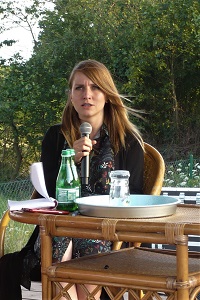
De Nederlandse dichter en vertaler Gerard den Brabander (eig. Jan Gerardus Jofriet) werd geboren in Den Haag op 3 juli 1900. Zie ook alle tags voor Gerard Den Brabander op dit blog.
Aan een Dame
Je denkt nu wel: jij met je wespentaille,
kartonnen schouders, gesoigneerde broek…
charmant! charmant! maar man, je drift is zoek:
wanneer ik nies, mon p’tit, voilà! dan zeil je
van het buffet naar ’t manlijk urinoir!
Maar je vergist je, opgedirkte deerne:
in zùlk een oord: kroeg, theehuis of taveerne,
voel ik me thuis, of ‘k bij mijn wijfke waar’.
Ik overzie en ik laat u maar praten:
gij zijt nog jong, nòg mooi, licht wat verwaten
en denkt: ik ben ’t, waarom de wereld draait.
Parmi vos gens, uw kerels, wat verwaaid,
wat slap van wil, want wat te veel geaaid,
voel ik mij nog een keizer der piraten.
Molens, meiden, melkvee
Molens maaien; meiden slaan het linnen;
visschen schieten bliksems door de vaart;
wolken steigren blindlings hemelwaarts
einders uit en storten einders binnen.
Kerken knielen. Toornig, buffelzwaar,
tarten zij den buik der westenwinden.
Dorpen hurken met geloken blinden
onder eeuwenoud en vaag gevaar…
Boeren, bultig in hun boezeroenen,
vechten stom en wrevlig met den wind:
knokig door vijandige seizoenen;
krom door God, den korzeligen vrind…
Molens, meiden, melkvee: visioenen,
droomen, jeùgd… die men niet wedervindt.
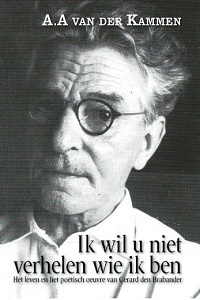
Cover biografie
De Britse toneelschrijver Tom Stoppard (eig. Tomas Straussler) werd geboren inZlín op 3 juli 1937. Zie ook alle tags voor Tom Stoppard op dit blog.
Uit: The Hard Problem
“SCENE SEVEN
Venice.
Hotel room: a good hotel; a floor-level minibar / fridge with an
interior light. Hilary, wearing a hotel bathrobe, her hair wet from the
shower, is kneeling by the bed, saying her prayers. Sound and spilled
light indicate an active shower, which is soon turned off. Spike enters,
wearing an identical bathrobe, wet from the shower. He is only slightly
wrong-footed by seeing Hilary at her prayers. He begins putting on his
pants and socks. During the scene he puts on the clothes he had taken
off. Hilary stands up. She watches Spike putting on his shirt.
SPIKE So … how’ve you been?
HILARYHave you got a date?
SPIKE
Did have … drinks party for UCL’s new Nobel, but it’s in the hotel
… I’ll catch what’s left of it. I can come back if you like.
HILARY
I’ll be asleep. In case I don’t see you, good luck with the physiology
of – what? I can’t be there. I’ll be at Leo Reinhart’s session.
SPIKE ‘The Physiology of High Stakes’. We took saliva samples at the world poker championship. The cortisol levels went crazy.
HILARY Is that good? I don’t mean good. Spike laughs. A beat.
SPIKE I haven’t heard from you for years.
HILARY I haven’t heard from you at all.
SPIKE Really? That’s bad.
HILARY (laughs) Is the sex better at UCL or Loughborough?
SPIKE UCL. Or it’s to do with being a prof. Won’t I see you on the boat?
HILARY Boat?
SPIKE The Krohl party, it’s on Jerry Krohl’s boat – an eyesore, frankly, but I had an invitation under my door.
HILARY No, I’m taking off after my round table – Florence, Siena, Pisa … on the cheap. Do you want to come?
SPIKE Don’t you have anyone to go with?
HILARY You’re anyone.
SPIKE Hilly.
HILARY Did you read my …
SPIKE Yeah … Let me make three points about your pre-print.”

Scene uit een opvoering in New York, 2018
De Nederlandse schrijfster Andreas Burnier werd op 3 juli 1931 in Den Haag geboren als Catharina Irma Dessaur. Zie ook alle tags voor Andreas Burnier op dit blog.
Uit: Een tevreden lach (De vrienden van mijn vrienden
“Er
komt een eind aan de solistische extase – voor enkelen pas met de dood,
als de geest hen door de poort haalt die afsnoert van het huisje,
tuintje, hekje, de souvenirs waar de kinderen niet aan mochten komen, de
paperassen die geen mens mocht inzien, de auto die alleen vader kon
besturen, de pedante antiekverzameling, de eigengereide spaarcentjes en
zo veel futiliteiten meer, om hen te baden in het Brahman, de wereldzee
van de gestorven zielen. Voor anderen, bleke, viesruikende oudste
dochters (de ‘bloklucht’ noemde ik dat in de oorlog) van armelijke
gezinnen soms al vóor het tiende jaar, als zij alle verantwoording en
zorg voor vijf kleine broertjes moeten dragen terwijl moeder a. naar
haar werkhuizen is (Ts. v. maatsch. Werk); b. met pa of zijn vervanger
ligt te hoereren op een vuile matras in de achterkamer (gewaagde
zedenschets, Middenstandsreeks, f 4,90).
Nu,
voor mij was het uit, het intellectueel solipsisme achterhaald, de
solo-emoties onverdraaglijk geworden, omstreeks het negentiende
levensjaar. Alles was bekeken, beleefd, uitgeput op het eerste niveau:
het snuffelen aan de wereld met de medemens louter als object.
Stiekemweg kwamen er mensen in mijn leven die een eigen betekenis
hadden, los van die voor mij.
Misschien
was the turning point de ontmoeting met professor W. en zijn lieve
secretaresse. Professor W. was in de eerste plaats een literair
kunstenaar en door een grillig internationaal uitwisselingsprogramma
kwam hij voor enkele maanden in Nederland. Ik stond, tamelijk beschonken
zoals altijd, bij Eylders, terwijl hij met de lieve secretaresse op een
soort verhoging pal boven mijn hoofd zat. Wij raakten in gesprek, in
het Engels, doordat ik hun in de volte een drankje aanreikte of zo.
‘Thank you, my dear. That is very kind of you. Are you a boy or a girl?’
Ik
deed hem denken aan het meisje uit A tree of night van Truman Capote
(toen nog amper ontdekt). Capote was nu juist mijn favoriet. Hij stelde
zich voor: professor W., op hooggeleerd uitwisselingsbezoek. Het was
ongelooflijk: een dichter, niet zo’n grote, maar toch een dichter.
Bovendien een hoogleraar die bij Eylders kwam en daar studenten
aansprak.”
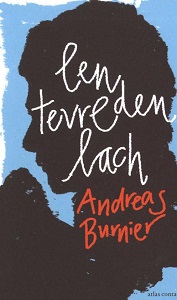
Cover
De Amerikaanse humoristische schrijver, columnist en bestsellerauteur David Barry, Jr werd geboren op 3 juli 1947 in Armonk, New York. Zie ook alle tags voor David Barry op dit blog.
Uit: Lessons From Lucy: The Simple Joys of an Old, Happy Dog
“People
often ask what kind of dog Lucy is. For years we didn’t know. We
assumed there was some Labrador retriever in her, because Labs are
super-friendly dogs that will mate with anything. There’s probably Lab
DNA in the British royal family.
Lucy
does look vaguely Lab-ish, but not like a purebred Lab. She’s a big,
muscular, short-haired, long-tailed, floppy-eared dog. Before her face
started turning white, she was jet-black except for white patches on her
throat and feet.
After
years of speculating, I finally decided to find out exactly what Lucy
is, so I ordered a genetic testing kit from a company called Wisdom
Panel. Their motto is “Dogs can’t talk, but their DNA can.” For the
record, this is a lie: Lucy can talk. If we ever attempt to sleep past
approximately 7:14 a.m., even on a weekend, Lucy barges into our
bedroom, paws the bed and says, “Wake up! It’s time to feed me and then
take me outside to make an absurd number of separate weewees!” The way
she pronounces this, it sounds like “Arrrooooowwwwrrr!” But there is no
question what she means.
Anyway,
the DNA testing kit was basically two swabs, which, following
instructions, I rubbed against the insides of Lucy’s cheeks, then mailed
back to Wisdom Panel, which conducts laboratory analyses of dog DNA. As
you know, “DNA” stands for
“Deoxyribobananafanafofafeefimoramalamadingdong acid,” which is a kind
of molecule that is found inside every single cell of every single
living criminal, which is why they are always leaving samples of it
behind at crime scenes. It is also found in all living plants and
animals except Madonna, who had all hers surgically removed in an effort
to maintain a more youthful appearance.
About a month later, I received the Wisdom Panel report on Lucy’s DNA. It begins:
Congratulations!
Lucy is a Boxer, Dalmatian, Chow Chow, Golden Retriever Cross.
According
to the DNA analysis, one of Lucy’s parents was a boxer; the other was
half-dalmatian and one-quarter each chow chow and golden retriever. So
Lucy is half boxer, a quarter dalmatian, one-eighth chow chow and
one-eighth golden retriever. Or, to put it in technical dog-breeder
terms, she’s a BoxMatianChowTriever.”
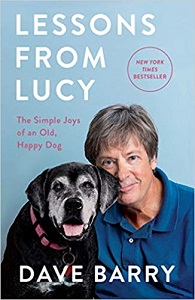
Cover
De Britse schrijfster Joanne Harris werd geboren op 3 juli 1964 in Barnsley, Yorkshire. Zie ook alle tags voor Joanne Harris op dit blog.
Uit: The testament of Loki
“Asgard
was falling. The plain below was cratered with fires and laddered with
smoke. Ragnarók, the End of the Worlds, lay upon us like a pall. Odin
had fallen; and Thor; and Týr. Gullveig-Heid, the Sorceress, stood at
the helm of the Fleet of the Dead. Dark Lord Surt, on dragon’s wings,
approached from out of Chaos, and where his shadow fell, the dark was
absolute, and terrible. Bif-rost was broken, and as I fell, clutching at
the last of my glam, I saw the great bridge come apart at last in a
fractal of brightness, spilling its millions of cantrips and runes into
the wild and shattered air, so that, for a moment, everything was
rainbow. . . . Okay, stop. Stop. Wind back. That’s the official version,
the tourist’s guide to Ragnarók. Bit much to take in all at once, I
know; and yet you’ll need to understand some of what happened in order
to grasp the magnitude of our rise and fall. Luckily–or maybe
not–there’s an official record. Delivered first as a prophecy, it’s now
all that passes for history among what’s left of our followers. The
Prophecy of the Oracle: a poem of thirty-six stanzas, outlining the rise
and fall of the Worlds, and retold through the centuries by every bard
who wielded a lute, or hack with a penchant for drama. That was the
first Age, Ymir’s time. There was no land or sea. Just void between two
darknesses, No stars by which to see. From the birth of the Worlds in
fire and ice, to their end in frozen darkness, the Oracle predicted it
all. The rise of the gods of Asgard, their Golden Age, and their
eventual fall were laid out in those thirty-six stanzas. The struggle
out of Chaos; the quest for the runes of the Elder Script; the many
adventures and exploits of Odin, leader of the clan; of Thor, his
mighty, though somewhat intellectually challenged son; of one-handed
Týr; of Freyja of the falcon cloak, Hawkeye Heimdall, and Balder the
Fair–and of course, Loki, the Trickster (that’s me); recruited from
Chaos by Odin himself, though not given credit in the text for any of
his virtues, his role in the narrative reduced to the series of tragic
events that marred the latter part of his career, much as the Titanic
has unfairly become a byword for disaster, rather than a celebration of
its many sterling qualities. Still, water under the bridge, now.”
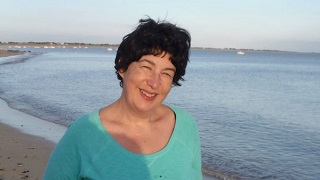
Cover
De Welshe dichter en schrijver William Henry Davies werd op 3 juli 1871 in Newport, Monmouthshire, geboren. Zie ook alle tags voor William Henry Davies op dit blog.
The Best Friend
Now shall I walk
Or shall I ride?
“Ride”, Pleasure said;
“Walk”, Joy replied.
Now what shall I —
Stay home or roam?
“Roam”, Pleasure said;
And Joy — “stay home.”
Now shall I dance,
Or sit for dreams?
“Sit,” answers Joy;
“Dance,” Pleasure screams.
Which of ye two
Will kindest be?
Pleasure laughed sweet,
But Joy kissed me.
Days Too Short
When primroses are out in Spring,
And small, blue violets come between;
When merry birds sing on boughs green,
And rills, as soon as born, must sing;
When butterflies will make side-leaps,
As though escaped from Nature’s hand
Ere perfect quite; and bees will stand
Upon their heads in fragrant deeps;
When small clouds are so silvery white
Each seems a broken rimmed moon–
When such things are, this world too soon,
For me, doth wear the veil of night.
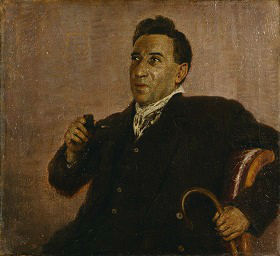
Portret door William Nicholson, 1921
Zie voor nog meer schrijvers van de 3e juli ook mijn blog van 3 juli 2017 en ook mijn blog van 3 juli 2016 deel 1 en eveneens mijn blog van 11 juli 2015.

